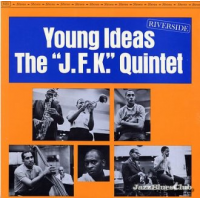
For a brief few years in the early 1960s, as jazz and all of music began to change, the J.F.K. Quintet experimented with multiple jazz influences of the day, and the results remain dynamic and exciting.
JazzWax tracks: Both albums are available on one CD,
JazzWax clips: Here's the J.F.K. Quintet playing Delories...
This story appears courtesy of JazzWax by Marc Myers.
Copyright © 2024. All rights reserved.


























